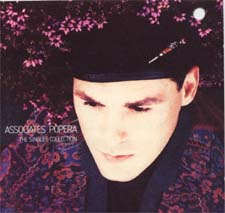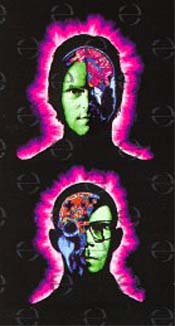
|
Pop matters! Not that you can tell from the PopMatters website's recent list of 100 Best Songs 1977 - 2003: http://www.popmatters.com/music/features/1977-2003.shtml
Steve Hyden, in his write-up of U2's "One" (ranked #29), shrugs, "'One' is not a song that you analyze." This is a willful evasion. To analyze "One" is to contend with the way the song gains meaning through the context of the work of the late gay photographer David Wojnarowicz, who died of AIDS - via the cover art for the single and the little-seen/rarely-aired first music video. Of course, hetero lust (and U2 lead Bono's narcissism) is the subject of the most played, and turgidly conventional, video promo for the song (while another unpopular video featured the band in drag and a father distanced from his gay son). The only song on the list to deal with AIDS? Its meaning is intentionally slippery and vague. That's why it makes the list. Hyden fails to recognize the song's signification of gayness (which would mean he'd have to, as Hyden lazily refers to it, "wax intellectual"), thus denying that gay experience can provide a source for a song that, as Hyden describes in his mini-critique, "touches on feelings that can't be articulated or relinquished." Like the rest of the list, Hyden chooses to deny the reality of contemporary life, the social context addressed by pop that matters. Bono grimly intones the wittiest flirtation with a gay reading on "One": "Did I disappoint you / Or leave a bad taste in your mouth?" It cannot bear comparison to Morrissey's family-AIDS revelation (i.e., complex expression and empathic catharsis) on "(I'm) The End of the Family Line" from the 1991 album "Kill Uncle". Morrissey sings: "Our family tree hacked into decline / And I'm spared the pain / Of ever saying / ("Goodbye")." Morrissey's devastating irony offers poetically clear and compound insight into the relationship of mortality and immortality in gay life during the era of AIDS. It also marks the auspicious pop achievement of communicating a truth never before, to my knowledge, expressed in any artform. You know that didn't make the list! Hyden, failing to "wax intellectual" or to "analyze," responds to U2's opportunistic elusion of meaning. "One" leaves a bad taste in my mouth. I disclaim it. Instead of U2's jangle-pomp pity, I refer readers/listeners to the pop-art empathy exhibited by ten-and-a-half songs - including "(I'm) The End of the Family Line" - that confront the reality of AIDS. The following songs, hardly exhaustive, substantiate what the PopMatters list would suppress: the impact AIDS has had on music, music culture, the culture at large, and the universal pop province of attraction, romance, and love. As evidence of pop, political, and personal perseverance in the age of AIDS, they are undeniable.
Morrissey and The Smiths measure the toll of that license in the back-to-back pairing of "Death of a Disco Dancer" and "Girlfriend in a Coma" on their greatest (and final) album proper: the 1987 "Strangeways, Here We Come". These two songs, cumulatively, track the political and spiritual effect of AIDS on gay people. The weariness of "Disco Dancer" - "The death of a disco dancer / well, it happens a lot 'round here" - gets expanded into a political challenge: "Well, I'd rather not get involved / I never talk to my neighbour." The masking of "boyfriend" with "girlfriend" on the generously infectious "Girlfriend in a Coma" invites the mainstream audience into gay people's collective introduction to the gravity of pop, love, and death: "Let me whisper my last goodbyes / I know - IT'S SERIOUS" (emphasis Morrissey's). If guitarist Johnny Marr's extended riff-response to Morrissey's call ("Love, peace, and harmony? / . . . / Maybe in the next world") expresses faith, then "Girlfriend in a Coma" explains where it comes from - and shares the revelation with the popular audience. That is hardly indicative of artists who front the "solipsistic conviction" that Matt Gonzales (ac)claims as "their inauguration into the canon of rock and roll" in his rundown of The Smiths' "This Charming Man" (#96). Gonzalez explicitly prefers this song to the (less successful) in-your-face fag-'tude of The Smiths' very first single, "Hand In Glove". Furthermore, the Smiths catalogue contradicts David Medsker's assertion of what "How Soon Is Now?" (#10) represents: Morrissey "steps up with the first ounce of nerve he's ever shown and righteously declares, 'I am human and I need to be loved, just like everybody else does." Wrong. It was neither the first, nor the last ounce of nerve Morrissey has wasted on solipsistic listeners - who believe that their self-contained realities are the only reality to which pop relates. That's why good songs (like "This Charming Man" and "How Soon Is Now?") can co-exist on the list with dreck (like "Smells Like Teen Spirit," "One," and "Stan"). The otherwise erudite and insightful critic/academic Chris Sieving mistakes homophobe Eminem's offensively self-absorbed simple-mindedness in the song "Stan" (#41) as significant because it isn't just about media hype (it concerns a rapper and his psychotic fan) - it also became the subject of media hype. Note Sieving's emphasis on the song's reception: "Much ink and countless pixels have already been employed in analyzing the links between Stan's deeds, Slim Shady's words, and Eminem's responsibilities as a commercial artist (and in deciphering Marshall Mathers' ability to separate the three)."
Chuck D's faith proves essential to the way he seeks out Truth and transformation through his art. It's dramatized in the opening of the song: "I got so much trouble on my mind / Refuse to lose / . . . / Then slapped the Mac(Intosh) / Now I'm ready to mike it." D and the Bomb Squad ("Never be a brother like me to go solo") consequently craft an exhilaratingly comprehensive musical "journey" through the era's contemporary socio-poli-economic confusions. Chuck D admits a private source of confusion (and rude comprehension) on "Meet the G That Killed Me," the addendum that immediately follows "Welcome to the Terrordome" (linked to that song by the startling sampling of media and the shared concern with urban dis-ease). Chuck D raps about "the chemical and biological warfare" of AIDS: "Man to man / I don't know if they can / From what I know / The parts don't fit / (Ahh shit)"! Prince begins his own Reagan/Bush-era survey with a moan, "Oh yeah. . . ." That's how Prince prepares himself to bear the burdens of the age on the 1987 "Sign 'O' the Times," from same-named album (and the concert film that vivifies the signs of the time on a stage of deliriously abstract race-and-sex codes). Then he proceeds to describe one of those burdens: "In France a skinny man / died of a big disease with a little name / By chance his girlfriend came across a needle / And soon she did the same." Prince catalogues a series of modern-day horrors, like AIDS, with such expressive emoting and direct language. Introduced in that opening moan (the 'O' in the song's title), Prince creatively transforms the Challenger explosion into a symbol of the era's reckless greed and ambition: "It's silly, no? / When a rocket ship explodes / And everybody still wants 2 fly." Despite signs of nuclear-age, AIDS-era doom, Prince finds salvation in the blues. Prince's blues-style reclamation of language and observation of behavior - and even Chuck D's confusion, and desire to educate/communicate - is preferable to "PopMatters" critic Scott Thill's boys-club generalizations that uphold rock-cric cred. Thill uses Public Enemy's 1989 "Fight the Power" (#8) as the opportunity to fortify received wisdom: "Pop music had no heart at that point; it was filled with metal lite -- just like now -- bubblegum pop -- just like now -- and major label swill -- just like now." Such lies, etched into cyber-stone, represent the power Public Enemy wants its audience to fight. Did Thill not hear the beating "heart" of gay pop acts like Erasure and the Pet Shop Boys? Erasure (with "Blue Savannah," "Save Me Darling," "When Will I See You Again?" and more!) and the Pets (with "West End Girls," "Your Funny Uncle," "Being Boring," "My October Symphony," "Decadence," and more!) are the two groups who have most consistently brought the significance of AIDS into the popular dance-club and radio forums. Significantly, neither Erasure nor The Pets received a single nod from the PopMatters collective.
"We'll be together again! / I've been waiting for a long time / We're gonna be we're gonna be / Together again" Erasure recognizes, celebrates and demonstrates the perseverance of human imagination. They apply the Truth of myth/narrative/ritual/metaphysical benevolence (faith) and manipulate the codes of doctrine/"common sense"/hegemony (homophobia). Erasure rightly commands the listener to "Stop!" in the face of undeniable - real - Love. If the PopMatters critics had stopped to think or to care about the opportunity such a list provided, they might have fulfilled the Pet Shop Boys' dream expressed in the heartrending reverie of "Dreaming of the Queen," from their magnificent 1993 album "Very". In it, the Pets express the need for a nation - and a culture - to recognize and to mourn the losses incurred by AIDS. The "desolate" dreamer of the song imagines Princess Di singing: "That there are no more lovers left alive / No one has survived / So there are no more lovers left alive / And that's why love has died / . . . / Diana dried her eyes." The song's elicitation of feeling promises collective catharsis.
The Pets affirm the necessary belief in an eternity - after so much loss - to liberate the infinite possibilities of existence. The song's exquisite polyrhythms restore the dancefloor to hallowed ground. It's in that space that pop music's history will always be written. |
|
 Bono and The Edge's "One" came in at #29 on the Pop Matters Top 100 songs between 1977-2003
Bono and The Edge's "One" came in at #29 on the Pop Matters Top 100 songs between 1977-2003  Billy Mackenzie
Billy Mackenzie  Outkast's "B.O.B. (Bombs Over
Baghdad)"
Outkast's "B.O.B. (Bombs Over
Baghdad)"  Erasure
Erasure  Scene from the Pet Shop Boys' video "Go West"
Scene from the Pet Shop Boys' video "Go West"